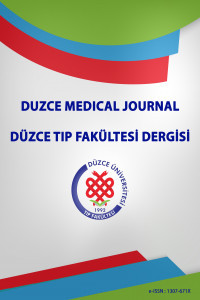Osteopatik Tıp Öğrencilerinin Çalışma Stratejisi Değişikliklerini Teşvik Etmek için Biçimlendirici Değerlendirmeden Yararlanmak: Gözlemsel Bir Çalışma
Biçimlendirici Değerlendirme, görsel-işitsel kaynaklar, erken müdahale, osteopatik tıp öğrencileri, geribildirim döngüsü, bilgi boşluğu
Utilizing Formative Assessment to Encourage Study Strategy Modifications by Osteopathic Medical Students: An Observational Study
Formative Assessment, audio visual resources, early intervention, osteopathic medical students, feedback loop, knowledge gap,
___
- Larsen DP, Butler AC, Roediger HL 3rd. Test-enhanced learning in medical education. Med Educ. 2008;42(10):959-66.
- Walker DJ, Topping K, Rodrigues S. Student reflection on formative e-assessment: expectations and perceptions. Learn Media Technol. 2008;33(3):221-34.
- Agarwal S, Norman GR, Eva KW. Influences on medical students self-regulated learning after test completion. Med Educ. 2012;46(3):326-35.
- Adams T, Webster B. Retention and confidence: the impact of confidence-based learning on knowledge retention. 2010.
- Das S, Alsalhanie KM, Nauhria S, Joshi V, Khan S, Surender V. Impact of formative assessment on the outcome of summative assessment - a feedback based cross sectional study conducted among basic science medical students enrolled in MD program. Asian J Med Sci. 2017;8(4):38-43.
- Prideaux D. Researching the outcomes of educational interventions: a matter of design. RTCs have important limitations in evaluating educational interventions. BMJ. 2002;324(7330):126-7.
- Epstein RM. Assessment in medical education. N Engl J Med. 2007;356(4):387-96.
- Aftab MT, Tariq MH. Continuous assessment as a good motivational tool in medical education. Acta Med Acad. 2018;47(1):76-81.
- Black P, William D. Assessment and classroom learning. Assess Educ Princ Pol Pract. 1998;5(1):7-74.
- Krasne S, Wimmers PF, Relan A, Drake TA. Differential effects of two types of formative assessment in predicting performance of first-year medical students. Adv Health Sci Educ Theory Pract. 2006;11(2):155-71.
- Spolsky B, Hult FM. The handbook of educational linguistics. 1st ed. Malden, MA: Blackwell Pub.; 2008.
- Cauley KM, McMillan JH. Formative assessment techniques to support student motivation and achievement. The Clearing House: A Journal of Educational Strategies, Issues and Ideas. 2010;83(1):1-6.
- Gaytan J. Effective assessment techniques for online instruction. Inf Technol Learn Perform J. 2005;23(1):25-34.
- Crooks TJ. The impact of classroom evaluation practices on students. Rev Educ Res. 1988;58(4):438-81.
- Butler DL, Winne PH. Feedback and self-regulated learning: a theoretical synthesis. Rev Educ Res. 1995;65(3):245-81.
- Henley DC. Use of Web-based formative assessment to support student learning in a metabolism/nutrition unit. Eur J Dent Educ. 2003;7(3):116-22.
- Sadler DR. Formative assessment and the design of instructional systems. Instr Sci. 1989;18(2):119-44.
- Mitra NK, Barua A. Effect of online formative assessment on summative performance in integrated musculoskeletal system module. BMC Med Educ. 2015;15:29
- Rushton A. Formative assessment: a key to deep learning? Med Teach. 2005;27(6):509-13.
- Nicol DJ, Macfarlane-Dick D. Formative assessment and self-regulated learning: a model and seven principles of good feedback practice. Stud High Educ. 2006;31(2):199-218.
- Vaz M, Avadhany ST, Rao BS. Student perspectives on the role of formative assessment in physiology. Med Teach. 1996;18(4):324-26.
- Chisnall B, Vince T, Hall S, Tribe R. Evaluation of outcomes of a formative objective structured clinical examination for second-year UK medical students. Int J Med Educ. 2015;6:76-83.
- Yayın Aralığı: 3
- Başlangıç: 1999
- Yayıncı: Düzce Üniversitesi Tıp Fakültesi
Mehmet Cihat DEMİR, Muharrem DOĞAN, Esra POLAT, Guleser AKPİNAR
COVID-19 Hastalarında Potansiyel İmmünolojik Tedaviler
Muhammet Mesut Nezir ENGİN, Öner ÖZDEMİR
Vivek JOSHİ, Michael YOUNGER, Bhargavi JOSHİ, Safeer KHAN
Yapay Zekâ ile Zor Trakeal Entübasyon Tahmini: Prospektif Gözlemsel Bir Çalışma
Kadir KÜÇÜKCERAN, Omer KARASAHİN, Orhan DELİCE, Ali BATUR, Sibel İBA YILMAZ, Engin ŞEBİN, Mahmut ŞENYURT
Ergin SAHİN, Arzu ÇÖLERİ CİHAN, Touraj ALİGHOLİPOUR, Katalin FOLDES, Evren Doruk ENGİN, Aykut ÖZKUL
Tünelli Hemodiyaliz Kateterlerinin Enfeksiyon Oranları
Ata ECEVIT, Okay Güven KARACA, Mehmet KALENDER, Osman Tansel DARÇIN
Halil KARA, Ayşe Betül ÖZTÜRK, Miray ÇETİNKAYA
Gizem PALA, Buket CİNEMRE, Ali ERDOĞAN
Hasan Baki ALTINSOY, Derya GÜÇLÜ, Sinem Coşkun KANTARCIOĞLU, Mustafa BOĞAN
